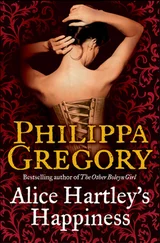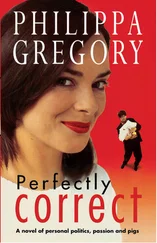On the pew sides, all the way down the church, I could see the callused hands of our workers. As they heard my heels tap on the stones of the aisle, they all clenched into a protective fist, with the index finger crossing the thumb. The sure defence against a witch. The one-handed secret sign of the cross. I walked, smoothly, stately, between the avenue of pagan fists. I looked neither to left nor right again. But their hatred and their fear of me followed me like a court train on a ball dress.
Once I was inside the pew, and the door safely closed behind us, all anyone could see of me was the grey silk bow on the top of my bonnet. I dropped my head on my hands then as if in prayer. But I had no prayers. I was just resting my burning forehead against my icy fingers and trying to blot out the sight of all those honest dirty hands making the sign of the cross against me. Trying vainly to ward off the evil they thought I carried with me.
Dr Pearce preached a good sermon. I listened, stony-faced. His theme was that wonderfully ambiguous instruction of rendering unto Caesar, and he made a persuasive case for resting content under the civil authorities — whatever they chose to do to their people. I doubt if any of his parishioners heard a word. There was a continual clatter of the dry coughs that indicate consumption, and a muffled choking from a child with pleurisy. A hungry baby cried unceasingly at the back of the church, a thin despondent wail. Even in the richly panelled, well-cushioned Wideacre pew there was no peace. Even when the Vicar told us, his uncertain eyes on Harry and me, that the word of the Lord said we might always do as we pleased.
After the final psalm I walked down the aisle again. Conscious, at every step, of the dull, resentful eyes on my face, and the rare warm glances directed at Celia, half a step before me. We no longer lingered in the churchyard to say good day to the tenants. That tradition had somehow vanished. But while we walked to the carriage I saw, from the corner of my eyes, the rotund figure of the miller, Bill Green, burst from the church porch and march determinedly towards the carriage.
‘Miss Beatrice!’ he called. ‘Good day, Squire, Lady Lacey, Dr MacAndrew,’ he said in an afterthought, recollecting his manners. Then his anxious eyes were on my face again as I settled myself in the carriage.
‘Miss Beatrice, I need to speak to you. May I come to the Hall today?’
‘On a Sunday?’ I asked, my eyebrows raised in genteel disapproval.
‘I have called on many a working day and you have been too busy to see anyone from Acre,’ said Miller Green, breathlessly. ‘But I must have speech with you, Miss Beatrice.’
The other parishioners were coming from the church door, staring curiously at the miller, whose usually happy face was now strained. One hand on my carriage door, begging for one moment of my time.
‘Very well,’ I said with my new dislike of the Acre poor when they were all together in a group staring at me. ‘Very well. Come to the Hall at three this afternoon.’
‘Thank you,’ he said. He stepped back with a little bow and I saw that his plump cheeks were sagged and that his bright skin colour had gone. He looked sallow and ill.
I did not need a visit from him to tell me what was wrong. I had seen this meeting coming from afar off, as soon as Harry and I agreed to send Wideacre corn out of the county.
‘This will ruin me, Miss Beatrice,’ Miller Green said desperately. ‘If Acre people have no corn they will not bring it to me for the grinding. If your tenant farmers sell all their corn in the grain they will not use my mill to make flour. If you send the whole crop out of the county, where am I to buy my grain to grind for flour to supply the bakers who buy from me?’
I nodded. I was sitting at my desk, the window to the rose garden open behind me. The two children were playing in the paddock and John and Celia were strolling behind them, watching Richard’s nurse steering him along the footpath towards the wood. Celia’s cream parasol was an echo of the daisies, cream roses, and rare white poppies. I had seated Miller Green at the rent table and ordered him a glass of small beer, but it stood beside him, untouched. He twisted and turned on the chair like a dog with fleas. He was a proud man, a rising man. But now he was a man in a panic. He could see his plans and his newly won prosperity sliding away from him as water slides over his millwheel.
‘Miss Beatrice, if you do not want the millwheel, which your grandfather built, to lie idle, if you want the poor to eat, if you want our lives here to go on at all, you must, you must, reserve some of the crop for sale locally,’ he said desperately. ‘Miss Beatrice, there’s me and my wife and our three lads, all three working on the parish gang now for poor parish rates. Little money coming in from them, and much shame for them. If we lose the mill, it will be the workhouse for us, for we will be penniless and homeless in one night.’
I nodded again, my eyes towards the garden. John and Celia had reached the gate to the wood. With tender patience they turned back towards the house so that the children should have the smooth grass of the paddock under their tottery feet. I saw Celia nod, her little bonnet tip in emphasis, and saw John throw his head back to laugh at her. I could not hear them. The window was open but there was still a wall of glass all around me. The glass made it possible for me to watch my son learning to walk holding another woman’s hands, with utter indifference; to tell this good man, this old friend, that he would indeed have to go to the workhouse and die in poverty and sorrow; to tell him that my will was as strong and unstoppable as the grinding stones of the mill. And that he and all the grasping, desperate, poor of Acre should be crushed and powdered so that a little boy, just learning this day to walk, should ride tall over the land.
‘Miss Beatrice, do you remember the harvest three summers ago?’ Bill Green said suddenly. ‘Do you remember how you rested in our yard while we got the harvest supper ready? How you sat in the sun for an hour, listening to the wheel turning and the Missus’s doves cooing?
‘D’you remember how the wagons came singing up the lane and how you let the harvest into the barn with the Squire so young and handsome riding high on the sheaves?’
I smiled in nostalgia. Unwillingly, I nodded.
‘Yes,’ I said tenderly. ‘Of course I remember. What a summer that was for us! What a harvest it was that year!’
‘You loved the land then, and all of Acre would have laid down their lives for one smile from you,’ Bill Green said. ‘That year, and the year before, you were a goddess in Acre, Miss Beatrice. Since then it has been like you were under a spell and everything has gone wrong. Wrong. All wrong.’
I nodded. I had the papers under my hand that showed it was all going wrong. Ruin was on the way. As surely and as steadily as the coming of the Culler. I could smell the hint of smoke in the summer air. The creditors were presenting their bills before the quarter day. They knew; I knew. Wideacre was overstretched. They could smell ruin like horses can smell a storm in the air. As I can smell smoke.
‘Set it right!’ Bill Green’s Sussex drawl was a longing whisper. ‘Set your hand to it, and make it right, Miss Beatrice! Come back to us, come back to the land, and set it right!’
I gazed at him blankly, dreaming of a return to the land, of a return to the old ways. But my face was as hard as one of his stones, and as cold as his millpond.
‘It is too late,’ I said, and my voice was dry. ‘The corn is already sold. I have already been paid. The agreement is made, and I can do nothing. This is the way farming is done these days, Miller Green. You may indeed face ruin. But if I do not farm as the other landowners farm, then I would be ruined too. I do not choose how the world should be run. I have only to find my way in it.’
Читать дальше
Конец ознакомительного отрывка
Купить книгу












